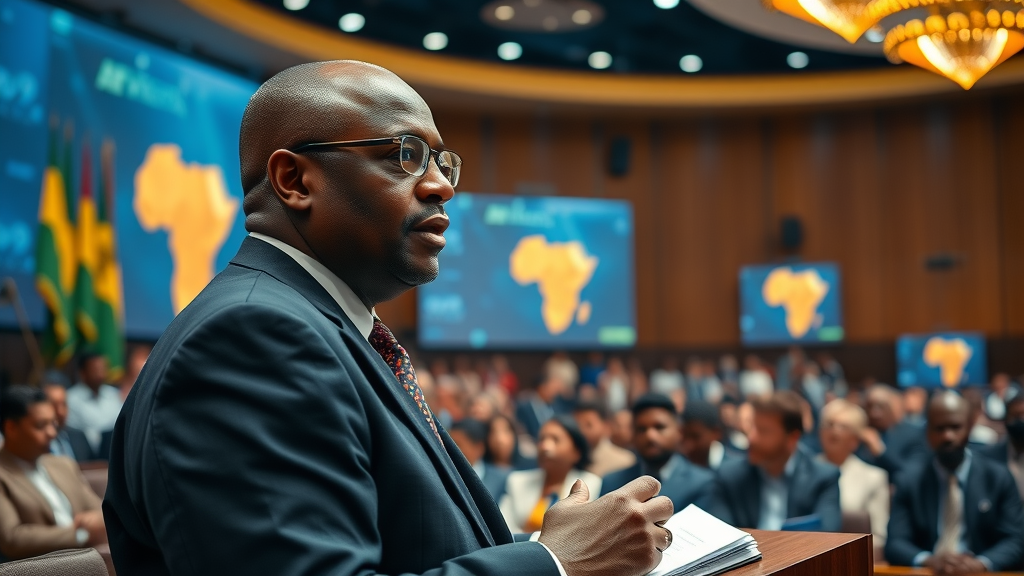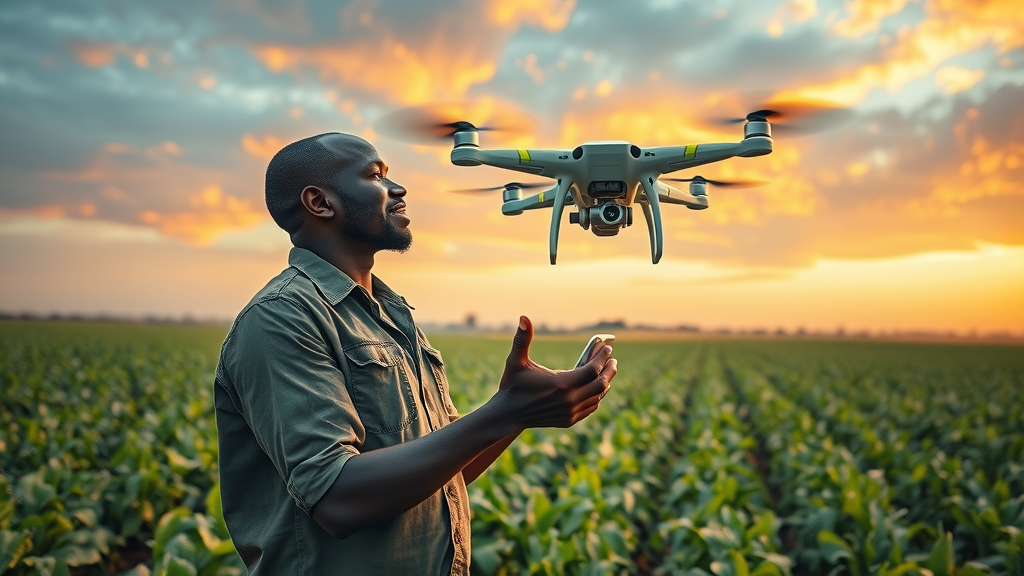Did you know? Less than 1% of global AI investments flow into the African continent, yet startups in Africa are outpacing global averages in tech adoption growth. This startling reality signals a profound transformation underway—a revolution not just shaping Africa's digital future, but also rewriting the global narrative about emerging technologies. Dive in to learn how artificial intelligence is blending with emerging tech to propel Africa as a rising force in the global AI ecosystem.
The Startling Reality: Where the Future of AI in Africa Stands Today
The future of AI in Africa is both promising and paradoxical. Despite being home to only about 2% of the world’s data centers, African countries are aggressively embracing artificial intelligence and emerging tech solutions to address continent-specific challenges. For example, in 2023, Nigeria and Kenya registered a record surge in AI-powered fintech launches, indicating that African leaders and entrepreneurs see AI as much more than a buzzword—it’s a catalyst for economic growth and sustainable development.
-
Over $1.6 billion was invested in African tech startups in 2022—up from $560 million in 2019, with a rising portion aimed specifically at AI development and local data infrastructure.
-
South Africa’s AI ecosystem now supports hundreds of local jobs, despite global headwinds, and a continental AI summit in Rwanda showcased over 50 AI models built for African languages and use cases.
Yet, with limited AI infrastructure and a digital skills gap, the continent’s journey into the future of AI in Africa remains a study in overcoming adversity with resourceful innovation. Practical examples abound: mobile-based health diagnostics in Uganda and AI-driven weather prediction in Ethiopia are already impacting millions and laying the foundation for future breakthroughs in sustainable development .

How Artificial Intelligence and Emerging Tech are Shaping the African Landscape
The convergence of artificial intelligence and emerging technologies is changing Africa’s development story at breakneck speed. Solutions such as AI-powered translation tools are unlocking content in local African languages , making digital technology genuinely inclusive and relevant for millions who were previously marginalized by language barriers.
At the same time, emerging tech like blockchain, IoT, and advanced analytics are enabling financial inclusion through mobile money and secure micro-loans. These technologies are addressing Africa’s unique challenges—often leapfrogging traditional infrastructure bottlenecks and showcasing just how inventive AI development can be on the continent. From renewable energy optimization using AI models in Kenya to precision agriculture in Ghana, Africa is demonstrating not only adoption but also locally relevant innovation that could soon influence the global economy .
Unveiling the Future of AI in Africa: What You’ll Take Away
-
Key trends driving AI development in Africa
-
Challenges and opportunities unique to African nations
-
The significance of local data and responsible AI
-
Expert opinions and future predictions
By the end of this article, you’ll see why the future of AI in Africa matters not just to the continent, but to the world. You’ll get clarity on which countries are leading, where funding is headed, and why African-led inclusive AI can set new standards for responsible tech.
Understanding the Foundations: Artificial Intelligence in Africa’s Emerging Tech Scene
The backbone of the future of AI in Africa lies in its vibrant, rapidly evolving tech scene. Across African countries, local governments, startups, and universities are co-creating frameworks that prioritize responsible, scalable AI development tailored to the continent’s realities. This drive is supported by both local data initiatives and global partnerships that aim to bring 21st-century infrastructure within reach for more African people than ever before.
Africa’s story isn’t just about catching up; it’s about creating a unique model of technological advancement. AI is being used not only for efficiency but also to drive sustainable development goals, with a special focus on data centers , renewable energy, and digital inclusion. This foundational work is essential for enduring change, economic growth, and a thriving AI ecosystem that reflects Africa’s diversity.
The Rise of Emerging Technologies and Their Influence on the Future of AI in Africa
The interplay between artificial intelligence and emerging technologies like blockchain, the Internet of Things, and digital health has transformed how African countries approach development goals . For instance, AI-driven crop monitoring, IoT-powered logistics platforms, and digital ID systems built on blockchain are now key elements of Africa’s digital infrastructure.
These new technologies create synergies—improving not just technical efficiency but also trust, transparency, and access for millions. It’s these radical shifts, fostered in local contexts, that are propelling Africa into the center of global digital conversations, ensuring the continent isn’t just a consumer of global AI but a prolific contributor as well.
The Role of Artificial Intelligence in Africa’s Economic Evolution
Deploying artificial intelligence is energetically driving economic transformation across Africa. By automating supply chains, facilitating financial inclusion, and enabling smarter infrastructure planning, AI is already delivering higher productivity and attracting investment from the private sector .
The economic promise extends far beyond simple cost-saving; AI is fostering entirely new sectors and job categories. Initiatives like AI-based language translation support e-commerce expansion, and predictive models in agriculture raise productivity yields—fueling sustainable economic growth while closing historical gaps in the global economy .
The Driving Forces Behind the Future of AI in Africa

The pulse of the future of AI in Africa is felt through proactive government policies, a flourishing startup scene, and rising cross-border collaborations across Africa’s digital ecosystems. Massive public and private initiatives have begun placing AI infrastructure on national agendas, bolstered by global AI summit spotlights and landmark investment announcements.
What makes this progress remarkable is the synergy between African leadership and grassroots innovators. While policies create a nurturing environment, it’s startups and home-grown AI talent that put African creativity on the international map, rapidly accelerating digital transformation and shaping a future that places Africa front and center in the era of emerging tech .
Government Policies and Support for Artificial Intelligence and Emerging Tech
African governments are increasingly crafting AI policies that align with sustainable development goals and prioritize indigenous innovation. In countries like Rwanda, the establishment of national AI strategies and digital transformation blueprints is tangible proof of governmental commitment. These policies encourage the creation of AI models that serve the continent’s unique needs and emphasize responsible AI principles such as fairness, transparency, and accessibility.
However, regulatory frameworks often struggle to keep pace with technological growth—highlighting the need for robust, flexible legislation and active participation from stakeholders at every level of the AI development journey. As more African countries recognize the opportunities of AI, the emphasis is shifting to skills development, research funding, and public-private partnerships.
Startups and Innovation: How AI Development is Accelerating Change
Innovation hubs across Africa are a wellspring of AI development . Cities like Nairobi, Lagos, and Cape Town have produced breakthrough startups such as DataProphet , which delivers AI solutions for manufacturing, M-Shule , an education-focused AI platform, and Aerobotics , a South African leader in AI-powered agricultural analytics.
These companies exemplify the surge of innovation driven by local entrepreneurs who spot untapped potential and translate it into scalable, exportable business models. Not only are these startups directly addressing African socio-economic challenges, but they’re also proving to global business leaders that Africa’s AI ecosystems are both inventive and resilient.
-
DataProphet (South Africa): AI for manufacturing optimization
-
M-Shule (Kenya): AI-powered adaptive learning for basic education
-
Aerobotics (South Africa): Agriculture analytics with AI-driven drone technology
-
Instadeep (Nigeria): Deep learning and optimization solutions
-
Flutterwave (Nigeria): Digital payments enhanced by AI fraud detection
Local Data: The Backbone of the Future of AI in Africa
“ Local data ” is the lifeblood of any successful AI system , and Africa’s unique demographic and cultural data sets offer unmatched opportunities for building inclusive, high-impact AI models. Yet, sourcing and structuring this data poses distinctive challenges linked to infrastructure, privacy, and regulatory constraints. As African nations seek to become net exporters of innovation, local data will determine not only the quality and relevance of AI, but also its fairness and societal impact.
Challenges in Sourcing and Leveraging Local Data for Responsible AI
Africa’s potential as a global AI leader is largely dependent on resolving foundational challenges in local data collection, quality, and management. The continent’s diversity—in languages, dialects, and contexts—demands robust, context-aware approaches to data sourcing. Infrastructure limitations, such as underdeveloped data centers and inconsistent internet access, hamper effective AI development and the delivery of responsible AI outcomes.
Simultaneously, gaps in digital literacy, regulatory ambiguity, and hesitancy around data sharing require new types of partnerships between governments, private sector players, and communities. Only with reliable, well-governed local data can African AI models achieve the scalability and trustworthiness needed to compete globally.

Innovative Solutions: African Approaches to Data Collection and Privacy
To overcome the unique data landscape, African innovators have adopted mobile-first strategies and crowdsourcing models that respect local norms and privacy concerns. For example, initiatives like Data Science Nigeria leverage SMS and WhatsApp-based data collection—bypassing traditional internet connectivity requirements and ensuring even remote communities are represented in AI training data.
Open-source platforms and community-led data trusts are gaining traction, fostering participative data governance and transparency. This empowers local communities and helps stakeholders build responsible AI that respects African values even as it meets international standards for privacy and security.
|
|
|
Comparison of Local Data Infrastructure: Africa vs Global Benchmarks |
|
Infrastructure Aspect |
Africa |
Global Benchmarks |
|---|---|---|
|
Data Centers per Million People |
~0.2 |
~3.5 |
|
Mobile Data Penetration |
47% |
75% |
|
AI-Ready Local Data |
Emerging |
Mature |
|
National Data Privacy Regulations |
In Progress |
Established |
Responsible AI: Ethical Imperatives Shaping the Future of AI in Africa
As AI systems increasingly influence public life, the ethics of responsible AI are moving to center stage in Africa. Issues around bias, inclusivity, consent, and algorithmic transparency present dilemmas that demand urgent, contextually relevant solutions—especially given Africa’s diversity and the rapid dissemination of emerging technologies .
Key Ethical Dilemmas Facing African Artificial Intelligence Development
With AI models being deployed in sensitive areas such as healthcare, finance, and governance, questions about fairness, accountability, and privacy are no longer academic—they’re real and urgent. Risks of bias, lack of explainability in AI decisions, and the potential marginalization of underrepresented communities are all critical concerns African AI leaders must address immediately.
“If Africa’s AI journey is to be truly transformative, we must build systems with African values—putting people, privacy, and justice at the heart of every algorithm.” — Dr. Vukosi Marivate, African AI Thought Leader
Striking a balance between technological progress and ethical stewardship remains a challenge. Deep dialogue with local communities—grounded in respect for cultural context—will be essential to forging solutions for inclusive and responsible AI .
Policies and Community-Led Approaches to Building Trustworthy AI
Increasingly, both governments and grassroots organizations advocate for policies emphasizing inclusivity, explainability, and ethical AI development. Community-led initiatives—such as data audits and transparency workshops—are making sure that African voices actively shape AI regulation, standards, and application practices.
Through multi-stakeholder collaboration and the co-creation of AI guidelines, African leaders are crafting blueprints for world-class, trustworthy AI—ensuring the continent doesn’t just catch up with global best practices but helps define them.
Major Sectors Revolutionized by the Future of AI in Africa
The impact of artificial intelligence in Africa is most pronounced in vital sectors like healthcare, agriculture, and financial services—industries directly aligned with the continent’s development goals . These sectors are not just adopting AI; they’re shaping new industry standards that reflect local priorities and realities.
Healthcare: Transforming Medical Services through Artificial Intelligence
AI is revolutionizing African healthcare by democratizing access to diagnosis and treatment. Solutions such as AI-enabled diagnostics apps are being piloted in rural clinics, and chatbots offer much-needed support to under-resourced health workers in local African languages. The benefits are tangible—improved patient outcomes, better disease surveillance, and increased reach of lifesaving interventions even where physical infrastructure is limited.
These innovations are helping African countries leapfrog historical limitations and build more resilient, equitable healthcare systems that can serve as models for emerging economies globally.
Agriculture: Emerging Technologies Empowering African Farmers
Smart agriculture is an area where emerging tech and AI models are transforming African livelihoods. Drone-based crop monitoring, soil analysis, and weather prediction tools powered by AI help smallholder farmers maximize yields, forecast risks, and manage limited resources more efficiently.
Such advances are vital for food security, economic growth, and rural upliftment. Empowering African farmers using locally relevant, context-aware tech is not only closing the yield gap but also unlocking wider market access and financial inclusion.

Financial Inclusion: AI and Emerging Tech Closing the Economic Gap
Africa’s burgeoning financial technology sector is leveraging AI to address systemic barriers to credit, savings, and insurance. Mobile payments, AI-powered credit scoring, and fraud prevention algorithms are bringing millions of unbanked Africans into the formal economy. Innovations like M-Pesa and Flutterwave are moving beyond payments—offering personalized financial advice and micro-investment products tailored to local realities.
-
AI-powered loan risk assessment platforms increase access to finance
-
Chatbots provide 24/7 financial advice in African languages
-
Fraud detection systems offer enhanced security for online transactions
Such technologies are key to bridging Africa’s economic gap and positioning the continent as a hotbed for fintech innovation within the global digital economy.
Empowering Local Talent: Education and Skills for the Future of AI in Africa

Cultivating AI talent is foundational for realizing the future of AI in Africa . African countries are investing in education—reimagining curricula, launching coding bootcamps, and building industry-university partnerships that empower a new generation of data scientists, engineers, and entrepreneurs.
Programs such as The African Masters of Machine Intelligence and the AI for Good challenge are nurturing home-grown talent, ensuring African innovators are developing AI systems relevant for local—and global—challenges.
Driving a New Generation: Training, Universities, and Partnerships
Local universities are stepping up to the plate, with flagship initiatives like the University of the Witwatersrand AI Lab and Carnegie Mellon Africa's AI programs offering world-class training. International collaborations—such as Google AI's research hub in Ghana—boost not only skills development but also the research capacity needed for long-term AI leadership.
“Our vision is to empower African youth to move from being technology consumers to creators and leaders in artificial intelligence.” — Adaora Mbelu, AI Educator and Innovator
These investments in talent development ensure that as AI systems become more pervasive, Africa’s voice and vision are woven deeply into the world’s digital future.
Stories from the Ground: AI Development Successes and Challenges
From Tunisia’s Instadeep raising international investment to Ghana’s Esoko platform supporting farmers with market data, success stories dot the African AI landscape. Yet, these advancements come packaged with persistent funding gaps, infrastructure hurdles, and a need for tailored regulatory frameworks.
Innovative Startups Defining the Future of AI in Africa
African startups like Zindi —a platform hosting African data science competitions—and Ulima , an AI-powered crop management system, illustrate the continent’s knack for turning constraints into opportunities. They serve as beacons for other innovators, spotlighting how home-grown companies can participate in the global AI economy while serving local needs.
By focusing on solving African problems with African solutions, these startups are driving both job creation and lasting societal impact.
Overcoming Infrastructure and Funding Obstacles
Forging Africa’s AI-powered future often means tackling tough realities: unreliable electricity, limited connectivity, and risk-averse investment climates. Many companies bootstrap or depend on energetic diaspora networks and impact funds eager to promote inclusive, innovative AI models .
-
Instadeep (Tunisia/Nigeria): Advanced AI for logistics and bioinformatics
-
Esoko (Ghana): Data-driven farmer resource management
-
Ubenwa (Nigeria): Neonatal health monitoring using AI models for early diagnosis
-
42Meta (Egypt): AI-powered search platform for African scientific research
These notable projects, spread across North, East, West, and Southern Africa, reveal the diversity—and resilience—of Africa’s tech startup ecosystems.
People Also Ask: What is the Potential of AI in Africa?

Exploring the Boundless Potential and Possibilities
The potential of AI in Africa is nothing short of transformative across sectors . The continent is well-positioned to scale digital health, smart agriculture, educational technology, logistics, and financial inclusion—thanks to innovations tailored to local languages and customs. As digital infrastructure matures and data quality improves, the opportunities for scalable impact grow.
-
Healthcare: Early disease detection, telemedicine, public health surveillance
-
Agriculture: Crop forecasting, yield optimization, climate resilience
-
Finance: AI-powered mobile banking, tailored micro-loans, risk analytics
-
Education: AI tutors, personalized learning in African languages
By merging technology with context, Africa is poised to reshape not only its future but also offer agile models for global digital transformation.
People Also Ask: Which Country is No. 1 in AI?
Spotlight on Africa’s Leading Nations in Artificial Intelligence
While South Africa is often cited as Africa’s top AI destination—with its deep research base and vibrant private sector—it faces stiff competition from Kenya, Nigeria, Rwanda, and Egypt. Each boasts strong AI ecosystems characterized by forward-thinking leadership, robust talent pipelines, and significant investment in data centers and training.
-
South Africa: AI research, education, and manufacturing-focused models
-
Nigeria: Startup powerhouse; fintech and language models
-
Kenya: Digital health and agricultural technology leader
-
Rwanda: Visionary policy and government innovation
-
Egypt: AI in scientific research and data analysis
This dynamic, regionally diverse landscape ensures Africa’s collective progress is not dependent on a single nation, but rather a series of interconnected, competitive ecosystems.
People Also Ask: What is the Future Prediction of Africa?
Forecasts for the Seamless Integration of Emerging Technologies and AI
Current trajectories point to growing integration between emerging technologies and AI by 2030—spurred by a mix of government leadership , homegrown innovation, and international collaboration. Experts forecast that as more African countries upgrade their digital infrastructure , AI technologies will become ever more woven into the fabric of daily life, powering smart cities, inclusive education, and advanced health systems.
-
AI and IoT-enabled “smart villages” drive rural economic growth
-
Digital identity and financial inclusion reach millions of unbanked citizens
-
Healthcare sees a shift from reactive treatment to predictive, preventative models
Thought leadership continues to stress the need for Africa-led standards in responsible AI —ensuring future predictions are realized in ways that put people first and foster global digital equity.
People Also Ask: How Far Behind is Africa in Technology?
Dispelling Myths: Africa’s Real Place in the Global Tech Race
While Africa lags certain global benchmarks in AI infrastructure , data availability, and connectivity, the myth of African countries being mere technology laggards is outdated. The continent’s leap to mobile-first solutions, AI-enabled fintech, and tailored AI models is attracting recognition from business leaders at global AI summits .
-
Kenya’s M-Pesa mobile payments outpace many Western fintech offerings
-
African startups deliver unique solutions for renewable energy and healthcare
-
Local data models are pushing forward the boundaries of inclusive AI
These disruptors are rewriting the narrative and cementing Africa’s role as an agile, inventive technology contender in the global economy—rather than a passive follower.
Global Partnerships: How International Collaboration Shapes the Future of AI in Africa
Cross-Continent Initiatives Fueling Artificial Intelligence Progress
Global partnerships are pivotal in Africa’s AI journey, unlocking access to resources, expertise, and international best practices. Notable collaborations with leading international tech firms and academic networks bolster skill-building and research, while nurturing home-grown AI ecosystems .
Initiatives like the Digital Africa Bridge, UK-Africa AI Research Partnership, and Google’s AI research center in Ghana are just the start—illustrating the vast potential for global AI companies to shape, and be shaped by, African innovation.
|
|
|
Major Global Partnerships Accelerating Africa’s AI Growth |
|
Partnership |
African Partner(s) |
Focus Area |
|---|---|---|
|
Google AI Research Center |
Ghana |
AI talent & natural language processing |
|
UK-Africa AI Research Partnership |
Multiple countries |
Health & agriculture |
|
Digital Africa Bridge |
Nigeria, Kenya |
Startup funding, talent development |
|
Carnegie Mellon Africa |
Rwanda |
University partnerships & research |
Barriers and Breakthroughs: What’s Holding Back the Future of AI in Africa?
Infrastructure, Funding, and Regulatory Challenges in Emerging Tech
Despite explosive growth, Africa’s AI revolution faces deep-seated infrastructure constraints, risk-averse local funding, and often fragmented regulatory landscapes. For many startups, bootstrapping or seeking international impact funds remains the reality, and patchy electricity supply still limits high-volume data processing.
Regulatory uncertainty can slow the adoption of responsible AI —making it vital for governments and business leaders to create a more enabling, supportive environment for innovation and ethical AI development.
Breakthroughs Leading to Scalable, Responsible AI Solutions
Despite these hurdles, breakthrough collaborations with international partners, localized approaches to data sourcing , and innovative financing models are unlocking new paths to scale and sustainability. The rise of community co-creation, hackathons, and regional policy networks like the African Union’s AI Taskforce illustrate how Africans are charting their own course—one that aligns AI progress with continental values and aspirations.
These advances underpin a growing consensus: Africa’s future in AI will be shaped by local empowerment, inclusivity, and an unwavering focus on ethical, context-driven innovation.
The Future Outlook: Thought Leaders’ Visions for the Future of AI in Africa
“Africa’s future in AI will be defined by collaborative problem-solving, where technology and local wisdom together lift people, economies, and environments.” — Omar Cissé, CEO, InTouch
-
AI holds opportunities to leapfrog persistent barriers—fueling economic growth, improving lives, and promoting digital sovereignty.
-
Risks remain: widening divides between regions, ethical lapses, and regulatory inertia could erode trust and stall progress.
The coming decade will test the resilience of African AI ecosystems , but visionary leadership and bold investments promise a vibrant, globally relevant future.
Key Considerations for Policymakers, Innovators, and Investors in Shaping the Future of AI in Africa
To unlock the full potential of artificial intelligence in Africa, policymakers should prioritize ethical frameworks, inclusive education, and seamless digital infrastructure investment. Innovators must embrace community co-creation, and investors should look beyond short-term returns—favoring partnerships that build local capacity, trust, and sustainability for the next generation of the african continent .
Action in these areas will determine whether the future of AI in Africa truly benefit all Africans, cementing the continent as a builder of the global digital economy.
Video: Exploring AI in Africa’s Future – Interviews with Key Innovators
Watch thought-provoking interviews with Africa’s top AI innovators as they discuss how emerging tech and local data shape healthcare, agriculture, and digital inclusion.
Video: Roundtable Discussion: Responsible AI Practices in Africa
Gain expert insights from AI ethicists, policymakers, and community leaders on building trustworthy, sustainable AI ecosystems for Africa’s unique context.
Frequently Asked Questions About the Future of AI in Africa
-
How can African nations foster responsible AI development? By investing in ethical training, engaging communities in AI policy-making, forging meaningful regulatory frameworks, and supporting core data privacy reforms, African nations can ensure their AI models align with society’s values and needs.
-
What are major funding channels for African AI startups? Leading options include government innovation grants, regional impact funds, diaspora venture networks, global tech partnerships, and investment from international development organizations—each crucial for closing local funding gaps.
-
Which sectors will benefit most from AI in Africa? The future of AI in Africa will dramatically transform healthcare, agriculture, finance, education, and logistics by providing scalable, context-aware solutions for millions across the continent.
-
How can stakeholders bridge the data gap? By promoting open data sharing, investing in mobile and offline data collection tools, and standardizing interoperability, governments and private sector leaders can close the gap and ensure robust, representative datasets.
-
How can local communities influence responsible AI use? Local communities can shape responsible AI by participating in data governance, contributing to regulatory dialogue, and acting as watchdogs to ensure technology serves their priorities and respects their rights.
A Look Forward: Why the World Should Watch the Future of AI in Africa
-
Africa’s journey blends world-leading innovation in emerging tech with unique challenges, offering lessons for global digital equity.
-
The continent’s distinctive data, youth-driven startup scene, and ethical approach to AI set new standards for inclusive, sustainable development worldwide.
Encouraging Ongoing Discourse, Investment, and Collaboration
Now is the moment for investors, technologists, and policymakers to champion Africa’s success story in global AI, fueling a virtuous cycle of innovation for generations to come.
Artificial intelligence (AI) is rapidly transforming various sectors across Africa, offering innovative solutions to longstanding challenges. For instance, in Malawi, the AI-powered chatbot app Ulangizi provides agricultural advice in Chichewa, assisting farmers in improving their practices. Similarly, in Kenya, the startup M-Situ utilizes AI-equipped devices to detect threats like illegal logging and fires, significantly reducing deforestation in areas such as the Ngong forest. ( time.com , elpais.com )
However, the continent faces significant hurdles in fully harnessing AI’s potential. Limited access to reliable internet connectivity and inadequate infrastructure pose substantial barriers to AI adoption in many African countries. Without robust digital infrastructure, the deployment of AI applications becomes challenging, hindering their scalability and effectiveness. ( afcacia.io )
To address these challenges, African nations are increasingly focusing on developing local AI strategies and infrastructure. Emphasizing data sovereignty and the establishment of local data centers are crucial steps toward building an inclusive digital economy. Investing in homegrown infrastructure not only enhances data security but also fosters innovation tailored to Africa’s unique needs. ( unu.edu )
In summary, while AI presents immense opportunities for Africa, realizing its full potential requires concerted efforts to overcome infrastructural challenges and develop strategies that prioritize local talent and data sovereignty.
 Add Row
Add Row  Add
Add 




Write A Comment